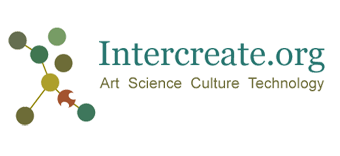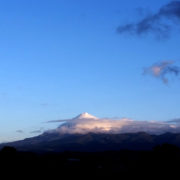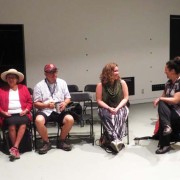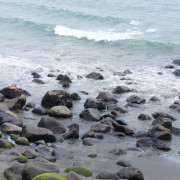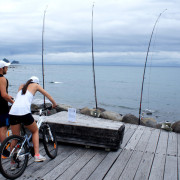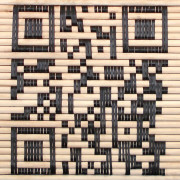SCANZ2013: skype bridge
This special session of 3rd nature involves six presentations from Europe. It occurs on Friday, February 1, 2013 8-9 pm, from Belgium, Germany, Spain and Austria and simultaneously Saturday, February 2, 2013, 8-9 am in Taranaki, Aotearoa New Zealand. This session occurs immediately after the Tomo Whakaari (Dawn Opening) for the 3rd nature exhibition has completed.
Authors
- Maja Kuzmanovich
- Verena Kuni
- Lorena Lozano
- Reni Hofmuller
- Annemie Maes
- Lenka Dolanova and Michal Kindernay
Vegetal culture
Maja Kuzmanovich, Brussels, Belgium
http://fo.am/search/?term=vegetal+culture
Abstract
At the epicenter of culture, gardening and technology we might be able to see how plants can become organisational principles for human society in the turbulent times of the 21st century. Although we have to scavenge the fringes of contemporary society, we can observe many healing effects that humans can have on their surroundings through a symbiotic collaboration with plants. People offer a helping hand to a struggling habitat through “natural farming” (Fukuoka 1990). Others design whole lifecycle systems inspired by natural processes, based on the art and science of bio-mimicry. However, on a systemic level, we still don’t know how to overhaul wasteful human behaviors en masse. How do we encourage a more resilient culture, so that humans and non-humans can continue living, preferably together? How do we stimulate a fertile entanglement of culture, gardening and technology that can give the rise to diverse and holistic communities of practice? Communities, are capable of forging symbiotic relationships between postindustrial human societies and the rest of the earth. Composting bitterness to grow beauty.
Bio
Maja is a generalist, with a background in Design Forecasting and Interactive Media. Maja is the founder, principal invigorator and chef de cuisine of FoAM. Prior to FoAM, she experimented with MR & VR in research institutes across Europe (GMD, CWI, Starlab), lectured (HKU), as well as collaborated with technological arts collectives such as Post World Industries and Pips:Lab. Her particular approach to people & technology has been recognized by the MIT’s Technology review & the World Economic Forum, awarding her the titles of Top 100 Young Innovator (1999) & Young Global Leader (2006). Her current interests span alternate reality storytelling, pata-botany, resilience, speculative culture and techno-social aspects of food & food systems.
Electro-Culture Revisited
Verena Kuni, Frankfurt, Germany
www.kuniver.se
www.under-construction.cc
www.gunst.info
Abstract
If technologies have always formed and informed our attitudes towards and relationships with nature, this is also true for the way we’re commuting and communicating the latter. But what does this mean exactly when looking at “human-plant relationships in the electronic circuit” – and at (DIY-) experiments with electricity, electronic media and network technologies in gardening and agriculture?
Bio
Verena Kuni is scholar in the field of history and theory of art and media cultures and professor for Visual Culture at Goethe University, Frankfurt Main. Since 1996 she is lecturing, researching and teaching at universities and art academies in Europe and beyond. From 1995 to 1999, she co-curated the video section of Kasseler Dokumentarfilm and Video Festival, where since 1999 she is director of the yearly interfiction summit for art, media, and network cultures. Her research is dedicated a. o. to transfers between material and media cultures; media of imagination and technologies of transformation; alternate realities; urban biotopes; DIY and prosumer cultures; games, play and toys as tools. She has published widely (print & online) on contemporary arts & media, their histories and futures. Since 1997, she also runs her own radio shows.
Econodos, a laboratory in the open fields
Lorena Lozano, Gijon, Spain
http://www.laboralcentrodearte.org/en/recursos/personas/lorena-lozano
Abstract
Econodos (a laboratory in the open fields) is an open platform for creators, artists and designers working on art and nature relationships. It is a knowledge exchange network that tries to visualize new ways of dialogue with the biosphere and to develop eco-technologies. In an inter-disciplinary and multi-technique way, it integrates design, architecture, biology, music and informatics. It works in the field of communication, social mediation, research, documentation and creation, developing collaborative activities (workshops, exhibitions, artistic interventions, social participation dynamics and public spaces-debates). The nodes operate as a knowledge-net, focused on the ecological, social and technological challenges that today’s society is faced with, while being anchored in three ecological registers –environment, social relations, human subjectivity. Projects developed are based upon new paradigms of the relationship between humans and nature, the increasing importance of urban agriculture and the role of art as innovative imagination and communication instruments.
Members: Lorena Lozano (biologist and artist), Rubén Suárez (designer) and Javier Palacios (marine biologist and programmer)
Projects: ecoLAB: http://www.laboralcentrodearte.org/en/plataformacero/ecolab
Is an experimentation laboratory at the intersection between ecology, art and open electronics. It is a project that generates subjectivities and dynamics in relation to the biosphere and its ecosystems, through the implementation of eco-technologies (high-tech and low-tech). it works at LABoral Centro de Arte y Creación Industrial, Gijón, Asturias. Greencity: Urban recepies in the limits between the urban and the rural; self-sufficiency, autoconstruction, DIY, harvesting the city, greening the surroundings. The same gardens: How are the artistic perspectives used politic tools on the praxis of social and environmental praxis? ¿Can aesthetics play a key role on these processes? How and why contemporary artists use new and emergent green spaces in the cities? To what extent are these visions another utopia fantasy? Biohacking: Reflections abut life, interpersonal relationships and philosophical meaning. How can scientific advances change the way we understand ourselves and our human beings ideals? What does the development of biotechnology mean for the human species in how we relate to each other and perceive the non-human environment? To what extent do the powerful new ways of manipulating life, separate the capacity for production and reproduction of living beings from the environment and the communities that they are historically immersed in?
Bio
Graduated in Biology, specialized in Botany, Universidad de Oviedo, Asturias, Spain (1998). BHons degree in Fine Art, specialized in Sculpture and Environmental Art, Mackintosh School of Art, Glasgow University, Scotland (2007) Master in History and Sociocultural Analysis, Universidad de Oviedo (2012). Currently coordinates the project ecoLAB at Laboral Centro de Arte y Creación Industrial (Gijón) and is PhD Universidad de Oviedo in “Nature, Art and Society”. From 2007 to 2010, collaborated in Barcelona with the teams Ciutats Ocasionals, Sitesize and Idensitat on artistic and interdisciplinary projects on landscape and public space in contemporary cities. Have done artist residencies at Museum Manuel Felguérez (2007, Zacatecas, México) and Rubha Phoil Permaculture Centre (2005, Island of Skye). Worked for five years at The Hidden Gardens (regeneration and community project at Tramway, Glasgow). Trained in the fields of landscaping and social work in Switzerland and Majorca from 1999 to 2001.
Aims and objectives of ESC: Production, Work-lab/Communication/Networking, Presentation and Documentation
Reni Hofmuller, Graz, Austria
http://esc.mur.at/
Possibility Grid
This title is programmatic for all the work we (the whole ESC-Team) do on a daily basis. In daily life, the decisions we take, the way we treat our surroundings, shows who we are. It was also the title of a show in 2011.
The central task of ESC is to produce and present art; the main emphasis is on the precise observation and seismographic capture of artistic processes that examine sociopolitical developments (information technology and biotechnology, socioeconomic systems) and new technologies (hardware and software).
Connected Open Greens http://esc.mur.at/opengreensgraz.html
The topic of Connected Open Greens is the implementation of contemporary art pieces by usage of gardening situations, especially looking into micro-sociological and ecological systems related to time as starting points for the development of new artistic practices. Community gardens provide access to fresh produce and plants as well as access to satisfying labor, neighborhood improvement, sense of community and connection to the environment. They are publicly functioning in terms of ownership, access, and management, as well as typically owned in trust by local governments or nonprofits. (Wikipedia) This approach should be used to introduce contemporary time-based art into local communities and environments that usually are not part of the artistic focus. Urban gardening thereby becomes a method to find alternative communication strategies for contemporary art. At the same time, technological and organizational knowledge from artists enters into the world of community-based local work. Inspirations for these strategies are collected from other art project and the TIK-partners, especially from OKNO with their experiences with their open green experiments.
Bio
“I want freedom, the right to self-expression, everybody’s right to beautiful, radiant things.” Emma Goldman”
Based in Graz, Austria, Reni works as a media artist and activist, musician, composer, performer, organizer and activist in the fields of usage of (new) media, technology and politics in general, engaged in development of contemporary art. Co-founder of ESC (artistic director), Radio Helsinki (community radio in Graz), mur.at, member of Institute of Media Archeology, 42 (artists group), /etc.
City Bee Monitoring
Annemie Maes, Brussels, Belgium
http://opengreens.net/category/opengreens/city-honeybees
It is remarkable to see how a bee population functions and evolves in accordance to the human activites we are developing around them: gardening and urban agriculture. Honeybees are very responsive to the different biotopes that we share they are good bio-indicators. Therefore we want to gather insight into what constitutes the diversity of our surrounding living place and research this on a deeper level. We developed yet different tools for identifying the specificity and relatedness of plants, insects and human activities. Adding new sensor networks to our Connected Open Greens distributed garden database, we hope to portray the surround Brussels Canal Zone, as it is changing over time into a continuous productive urban landscape. With this new project, Corridors, in which city honeybees play the leading role, we want to research how the sustainability of cities can be increased in the future, and how citizens can be actively involved.
Bio
Annemie Maes, media artist and activist, holds master degrees in fine arts and cultural studies. Her artistic research and cultural activism projects are publicly presented as ‘politics of change’ with a focus on actual topics as ecology and women empowerment. Most of the projects are linked to the problematization of new art in public space, from a socio-cultural background. Annemie Maes is co-founder of Okno, an artist-run organization working with media art and ecology. Her recent research work focuses on Corridors & Connected Open Greens, both transdisciplinary projects at the intersection of art, biology and green technology.
KRA – Kravín Rural Arts
Lenka Dolanova and Michal Kindernay, Kravin, Czech Republic
http://yo-yo-yo.org/en/
KRA – Kravín Rural Arts is an emerging residency center based in a former cow-house in a small Czech village. Based in rural area, we are forced to work with “indigenous” people, the “locals”. The necessity to confront various “cultures” is obvious. Our aim is to use the means and tools of arts to challenge the local 3 ecologies (environmental, mental, social, as described by Félix Guattari). We fight the mortification of traditions by inserting new living traditions. We organize walks with artists sonifying fences and trees. Walking is the basic tool for acquiring pieces of local knowledge, “solvitur ambulando”, solving problems by walking and talking. We urge other artists to play on barrels, on the wind, on local broadcasting system. We construct beehives. We input ourselves as artists and researchers, into our community, using camouflage of beekeepers, gardeners, denizens, who we became. While city bees have allegedly more honey than village bees, citizens consume more products from “farmers’ markets” than villagers. The villages are losing their apples, pears and cherries. The diversity, variability and fruit-fullness is what we are fighting for, armed with unholy trinity: ecology + media + art.
– KRA = floe
– KRÁ = “caw” or “kaah”, sound of raven
– KRAVÍN = cowhouse
Bio
Yo-yo is a non-profit organization started in March 2009 by collective of artists, curators and organizers. Since 2012 it is divided into two interconnected branches – Yo-yo urban and Yo-yo rural -, based in Prague and Hranice u Malče (Vysočina). Yo-yo is initiating and supporting the experiments at the intersection of art, ecology and media, across the rural and urban contexts. Our aim is to explore the new spaces for art, outside of the official art centers. Since 2010, it has been involved in developing the KRA (Kravín Rural Arts) project of residency center in the village Hranice u Malče in Vysočina region of the Czech Republic – a space for creation, meetings, and discussion, dedicated above all to ecological media arts.
